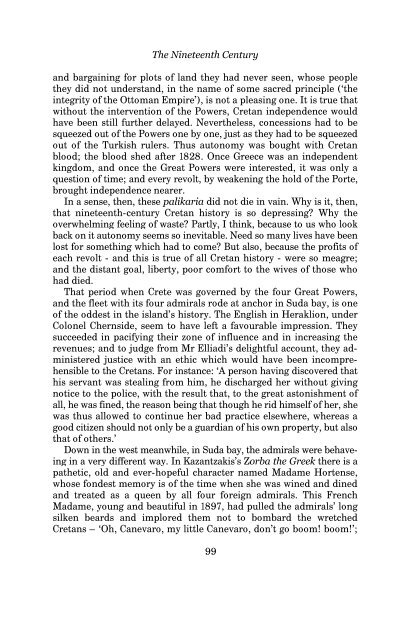free download here - Michael Llewellyn-Smith
free download here - Michael Llewellyn-Smith
free download here - Michael Llewellyn-Smith
Create successful ePaper yourself
Turn your PDF publications into a flip-book with our unique Google optimized e-Paper software.
The Nineteenth Century<br />
and bargaining for plots of land they had never seen, whose people<br />
they did not understand, in the name of some sacred principle (‘the<br />
integrity of the Ottoman Empire’), is not a pleasing one. It is true that<br />
without the intervention of the Powers, Cretan independence would<br />
have been still further delayed. Nevertheless, concessions had to be<br />
squeezed out of the Powers one by one, just as they had to be squeezed<br />
out of the Turkish rulers. Thus autonomy was bought with Cretan<br />
blood; the blood shed after 1828. Once Greece was an independent<br />
kingdom, and once the Great Powers were interested, it was only a<br />
question of time; and every revolt, by weakening the hold of the Porte,<br />
brought independence nearer.<br />
In a sense, then, these palikaria did not die in vain. Why is it, then,<br />
that nineteenth-century Cretan history is so depressing? Why the<br />
overwhelming feeling of waste? Partly, I think, because to us who look<br />
back on it autonomy seems so inevitable. Need so many lives have been<br />
lost for something which had to come? But also, because the profits of<br />
each revolt - and this is true of all Cretan history - were so meagre;<br />
and the distant goal, liberty, poor comfort to the wives of those who<br />
had died.<br />
That period when Crete was governed by the four Great Powers,<br />
and the fleet with its four admirals rode at anchor in Suda bay, is one<br />
of the oddest in the island’s history. The English in Heraklion, under<br />
Colonel Chernside, seem to have left a favourable impression. They<br />
succeeded in pacifying their zone of influence and in increasing the<br />
revenues; and to judge from Mr Elliadi’s delightful account, they administered<br />
justice with an ethic which would have been incomprehensible<br />
to the Cretans. For instance: ‘A person having discovered that<br />
his servant was stealing from him, he discharged her without giving<br />
notice to the police, with the result that, to the great astonishment of<br />
all, he was fined, the reason being that though he rid himself of her, she<br />
was thus allowed to continue her bad practice elsew<strong>here</strong>, w<strong>here</strong>as a<br />
good citizen should not only be a guardian of his own property, but also<br />
that of others.’<br />
Down in the west meanwhile, in Suda bay, the admirals were behave-<br />
ing in a very different way. In Kazantzakis’s Zorba the Greek t<strong>here</strong> is a<br />
pathetic, old and ever-hopeful character named Madame Hortense,<br />
whose fondest memory is of the time when she was wined and dined<br />
and treated as a queen by all four foreign admirals. This French<br />
Madame, young and beautiful in 1897, had pulled the admirals’ long<br />
silken beards and implored them not to bombard the wretched<br />
Cretans – ‘Oh, Canevaro, my little Canevaro, don’t go boom! boom!’;<br />
99


